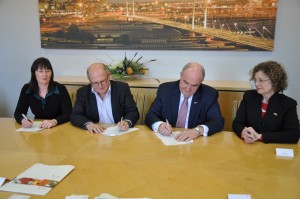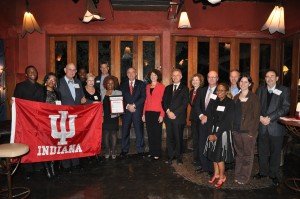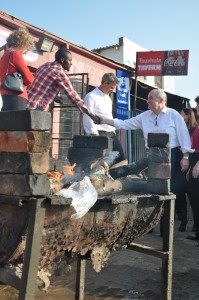South Africa: ‘A great lab to engage’
Collaboration. Contradiction. Challenge. Community.
It was a day to reflect on each of these four “C’s” as the Indiana University delegation took part in its first full day of activities since arriving this past weekend in Johannesburg, South Africa, beginning with an early-morning visit to the nation’s premier business school, the Gordon Institute of Business Science.
GIBS, which it is commonly referred to as, is part of the University of Pretoria, one of South Africa’s leading research, teaching and learning universities. It is situated in a beautiful greenfield campus that lies just outside the suburb of Sandton, Johannesburg’s business hub. To say the school is on the fast track to success would be a gross understatement. Established a little over a decade ago, the school is already considered the top business school for executive education in Africa. Just last year, the Financial Times ranked the GIBS executive MBA No. 1 in Africa and 60th in the world.

Gordon Institute of Business Science Dean Nick Binedell and IU President Michael A. McRobbie sign a new partnership agreement between GIBS and IU’s Kelley School of Business.
With a catchy marketing slogan (“We mean business”) and a philosophy based on — to borrow from school dean and founding director Nick Binedell — “pragmatism and a can-do model,” GIBS is seeking to build upon the rapid success of its executive education program while fostering a well-functioning business community in a country continually challenged by the tension between its well-documented history and a future filled with potential opportunity. Indeed, both history and opportunity are reflected in GIBS’ mission: to be a business school for and from the country, one that offers a learning environment for anyone with the ideas and innovations to make an impact in South Africa, whether he or she be a successful company chairman or a 17-year-old with the energy and drive to tackle the country’s most pressing challenges.
“This is a great lab to engage,” Binedell said.
As the morning discussions at GIBS progressed, it became increasingly clear that Binedell and his colleagues had found the ideal partner in Indiana University, which has been fostering an understanding of and appreciation for this most dynamic part of the world for more than a half-century.
As IU President Michael A. McRobbie neatly summarized, IU’s involvement in Africa has spanned a remarkable range of activities, most of which can be found in the university’s acclaimed African Studies Program, long recognized as one of the leading centers for the interdisciplinary study of Africa. The program, which celebrated its 50th anniversary in 2011, is one of 11 federally funded Title VI area studies centers in IU’s new School of Global and International Studies, the largest number of such centers anywhere in the United States. The program offers more African languages than any other U.S. college or university, as well as a wide spectrum of academic offerings that includes African art, film, folklore, history, literature, music, public health and more.
Since the inception of the African Studies Program, IU has provided instruction in 52 African languages. The university regularly teaches Akan/Twi, Arabic, Bambara, Swahili, Wolof, Yoruba and Zulu, from the elementary level all the way up to the most advanced levels. IU faculty have also published more books on African languages and linguistics that any other U.S. institution. In addition, the relocation of the National African Language Resource Center to IU Bloomington (IU is the only university with such a center) has served to further strengthen its position as a premier institution for the teaching of African languages.
The depth and breadth of IU’s continued involvement in African studies, its top 10 international ranking (in terms of students studying overseas and number of international students) and its strategic decision to amass all of its international expertise (including 350 faculty members) in the newly formed School of Global and International Studies, made a major impression on the GIBS executive leadership team. The GIBS team was equally struck by the level of international engagement — including in Africa — of IU’s Kelley School of Business, which, as Dean Idie Kesner explained, has placed students in specially designed overseas studies programs in Egypt, Ghana, Kenya, South Africa and Uganda.
In turn, it was easy for members of the IU delegation to be encouraged by the rapid growth of GIBS and the school’s strong desire to develop a sophisticated business infrastructure in South Africa that, in the words of one GIBS faculty member, “rewrites the literature” of an Africa of famine and war and introduces the world to a diverse, dynamic economy energized by increasing intellectual activity.
Demonstrating a shared commitment to adding to South Africa’s intellectual and social capital, the leaders from IU and GIBS concluded the morning meetings by inking a new, formal partnership agreement that calls for, among other collaborative activities, the sharing of faculty expertise, collaborative research projects and, most importantly, future study abroad opportunities for students from both institutions.

IU President McRobbie and members of the IU delegation pose with the university’s first South African alumni chapter.
After the signing of the formal agreement, members of the IU delegation were given a memorable opportunity to tour the Diepsloot settlement, which GIBS officials say they are using as a “learning lab” that is intended to provide students with a better understanding of the needs and aspirations of Africa’s “emerging less poor” and to encourage them to pursue informed business ideas that will improve the quality of life within the local community.
Crowded, noisy, dusty Diepsloot, where half the total population (400,000, living in a 5-square-kilometer area) are unemployed, came in clear contrast to the openness and order of the GIBS campus and provided a first-hand glimpse of South Africa’s complexities and contradictions. Yet it was equally striking how friendly and forthright members of the township were, as they enthusiastically welcomed members of the IU delegation into their shops and, in one instance, their family home.
Finally, a busy and diverse day concluded with community-building of a different sort: the establishment of IU’s first alumni chapter in South Africa, led by founding chapter president Nolutho Diko, who spoke glowingly and movingly about IU and what the university has meant to her and her family. Her remarks were a fitting end to a first day of fostering new friendships, furthering IU’s traditions of international education and engagement, and offering a measure of what IU will seek to accomplish with its global partners, like GIBS, in the years to come.
Tags: African Studies Program, GIBS, Gordon Institute of Business Science, Idie Kesner, Indiana University, IU Alumni Association, Johannesburg, Kelley School of Business, Michael McRobbie, Nick Binedell, Nolutho Diko, School of Global and International Studies, South Africa, University of Pretoria


